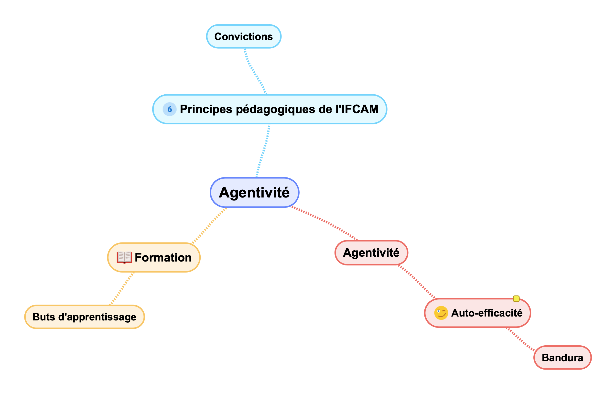Agency or the art of acting on one’s learning
In education, agency is the power of a learner to act on his or her learning and to be an actor. At IFCAM, we are convinced that a learner who constructs his or her own knowledge and therefore mental representations benefits from deeper learning, better memorization of information, strong commitment and more solid connections between information than a learner who is more involved in receiving information.
What is agency?
An actor, in the primary sense, is a person who acts, who has a role, who is a stakeholder in a project.
Agency is the power of action of a being, it is “his capacity to intervene in the world and in others”. In education, it is the power of a learner to act on his or her learning and to be an actor in his or her learning. When learners are active and use their power, they are agents of their actions and therefore demonstrate agency.
Why be interested in agency in training?
Being interested in
agency in training means being interested in the
learners‘ ability to
construct their own knowledge. A learner who constructs his or her own knowledge and mental representations benefits from deeper learning, better memorisation of information, strong commitment and stronger connections between information than a learner who is more involved in receiving information. The constructivist movement has made it possible to highlight this.
In this constructivist perspective, agency is not an innate ability, it is constructed and developed throughout life, particularly through feedback.
Let’s start with a practical observation. When a learner does a piece of work and asks for feedback from the trainer, he or she expects
feedback. Depending on their beliefs in their abilities, learners anticipate the type of feedback they will receive. If they do not believe they are capable of doing the work required, their expectations are low and conversely if they know they are capable, their expectations are high.
If the work is adequate and suitable for what was required, the trainer can give positive and encouraging feedback to the learner. Seeing oneself as successful gives the learner
active experiences of mastery (Bandura, 2003). These experiences confirm to the learner that he or she has been able to produce quality work in line with the instructions. This feedback reinforces the learner’s belief in his or her abilities, regardless of the level of belief at the outset. Conversely, if the learner’s beliefs are strong and the feedback is that their work does not meet expectations, their belief in their abilities will decrease and they will be less confident in their future work. The form of the feedback is very important to enable the learner to accept it, bounce back and use it to match the trainer’s future expectations.
These beliefs are conceptualised under the term
self-efficacy: “the individual’s
belief in his or her ability to organise and execute the course of action required to produce desired outcomes” (Bandura, 2003).
Self-efficacy is the key to agency (Bandura, 2001). This belief enables :
– Facing and overcoming obstacles
– Directing and steering persistence in the task
– Set ambitious goals that match skills
– Strengthening commitment, interest and, by extension, motivation
Group work is a modality that creates a dynamic of collective self-efficacy and is also a factor that promotes interest and therefore retention in the task.
Innovation and agency
In 2018, Nagels, Abel and Tali conducted research on innovation and learner agency. They describe innovation in education as seeking to improve what already exists. The aim is to foster learning by providing relevant learning environments that engage learners.
This requires action, testing, creating and making mistakes (notion of the right to make mistakes). Their research focuses on digital working environments. The participants in the study belong to a group that has a digital work environment. They use a semantic map or mind map (see example below) to access resources. The maps and resources can be annotated. Each learner has access to the annotations of their group and can compare their workspace with that of other groups. Easy access to resources and learning with peers are also principles dear to IFCAM.
Convictions – Beliefs / Principles pédagogiques de l’IFCAM – IFCAM’s main educational principles /Agentivite – Agency / Formation – training / Buts d’apprentissage – Learning Goals / Auto-efficacité – Self-efficacy
These researchers propose 5 avenues to be explored for the implementation of an
innovative learning environment:
– Acting on the environment itself and not only on its content
– Provide interactive resources
– Encourage the construction of a personal learning environment by the learner
– Empowering learners to seek knowledge
– Raising awareness of self-regulation and responsibility for learning to enhance learners’ agenticity.
In short, feedback, working environments and group work are interesting levers for encouraging learners to believe more in their skills. Believing in one’s skills is a first step towards agencyand
self-regulation of learning.
Camille Besson, work-study student in charge of Learner Experience projects.
Bibliography :
Bandura, A. (2001). Social cognitive theory : an agentic perspective. Annual review of psychology, 52, 1-26.
Bandura, A. (2003). Auto-efficacité. Le sentiment d’efficacité personnelle. Bruxelles : De Boeck.
Nagels, M., Abel, M.-H., & Tali, F. (2018). Focus on the Agency of Learners to Innovate in Pedagogy. In A. Visvizi, M. Lytras, L. Daniela. The Future of Innovation and Technology in Education : Policies and Practicies for Teaching and Learning Excellence. Bingley, United Kingdom : Emerald Publishing Limited








